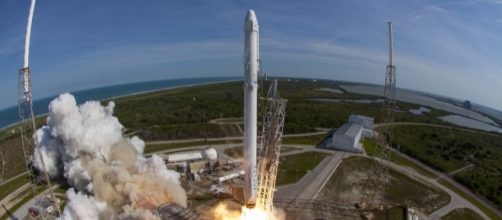Elon Musk's SpaceX space transport company is set to launch a US Military satellite into orbit today, April 30. This will be the first launch in a new contract with the government agency, which Musk's company has been trying to attain for the past couple of years. Details regarding the payload and destination are unfortunately classified and neither the government nor SpaceX is willing to officially comment on the details of the cargo.
Top secret
Aside from the launch date and location, which is today at 7 a.m. ET at the Kennedy Space Center in Cape Canaveral, Florida, no other details regarding the payload has been revealed.
However, based on the fact that the delivery was ordered by the National Reconnaissance Office of the US Military, it can be assumed that it is some type of surveillance satellite.
The National Reconnaissance Office is known to be the country's "eyes and ears" and is responsible for developing and maintaining US spy satellites. The payload, which is being referred only as NROL-76, is set to be delivered to an unspecified orbit around the planet. Its mission, functions, and overall specifications are currently unknown.
Fighting for its right
The US government previously had a locked contract with United Launch Alliance, which is a joint venture company by Boeing and Lockheed Martin. All of the launch requirements for government agencies automatically went to the company, which resulted in Musk filing a lawsuit against the government back in 2014.
Musk wanted his company to be given a fair chance to bid for military contracts and it looks like all of his efforts have finally paid off.
More launches to come
Aside from this weekend's launch, SpaceX is also set to deliver additional payloads for the US Military as well as a reported new GPS satellite for the Air Force. Given that the company utilizes its revolutionary Falcon 9 rockets, it is understandable that the government would want to go with the lowest costing option. SpaceX's Falcon 9 rockets are reusable two-stage-to-orbit vehicles that are able to launch and land vertically.
This allows the company to save on cost as it is able to reuse the first stage rocket booster, which reportedly accounts for 70 percent of the cost of the rocket.
Each rocket costs the company over $62 million. Due to its reusability, SpaceX is able to bring down the price of
SpaceX's Falcon 9 rockets are reusable two-stage-to-orbit vehicles that are able to launch and land vertically. This allows the company to save on cost as it is able to reuse the first stage rocket booster, which reportedly accounts for 70 percent of the cost of the entire rocket. Each rocket costs the company over $62 million to make. Due to its reusability, SpaceX is able to bring down the price of bringing equipment into orbit by a significant amount when compared to traditional rockets used by other agencies.

